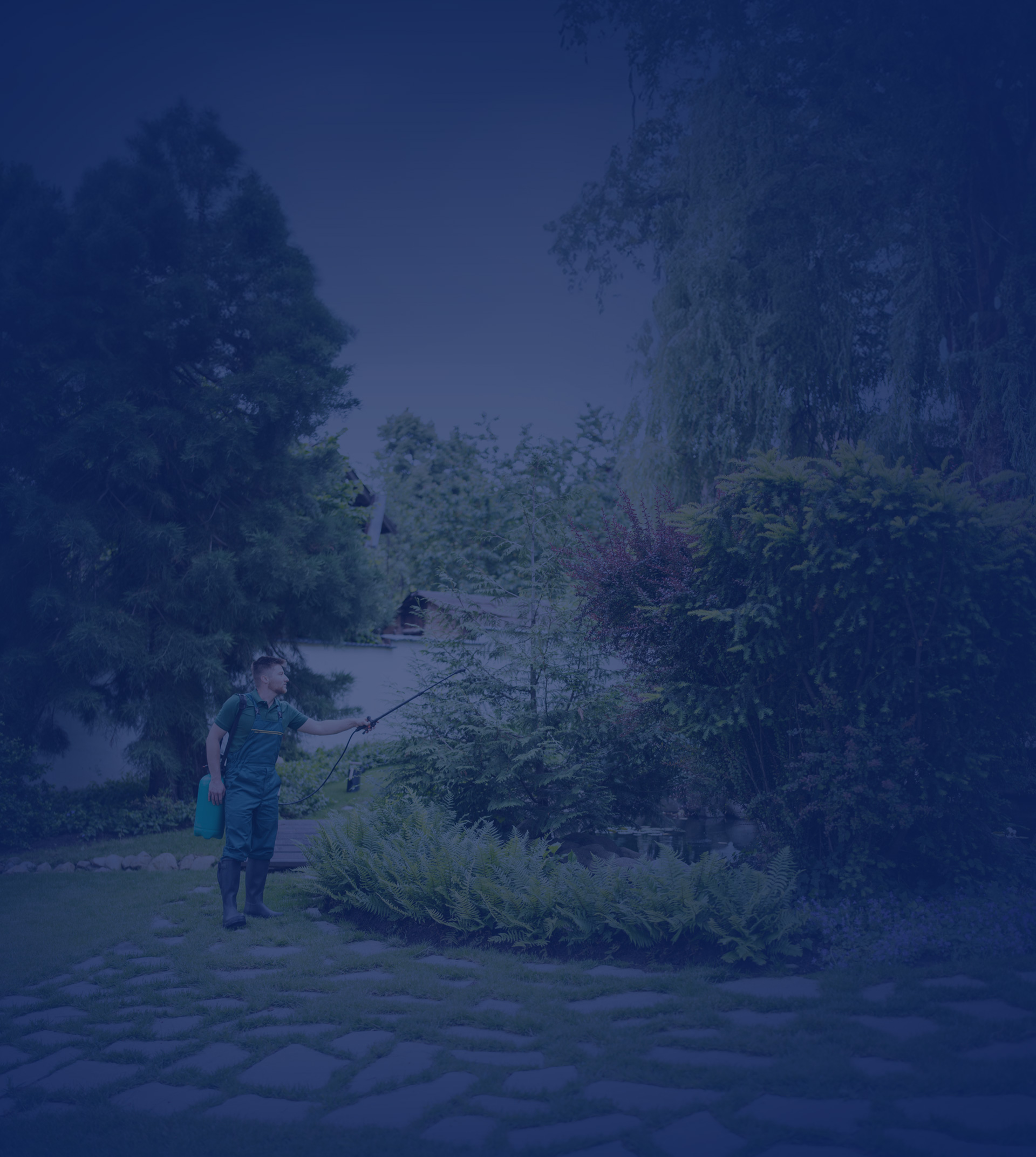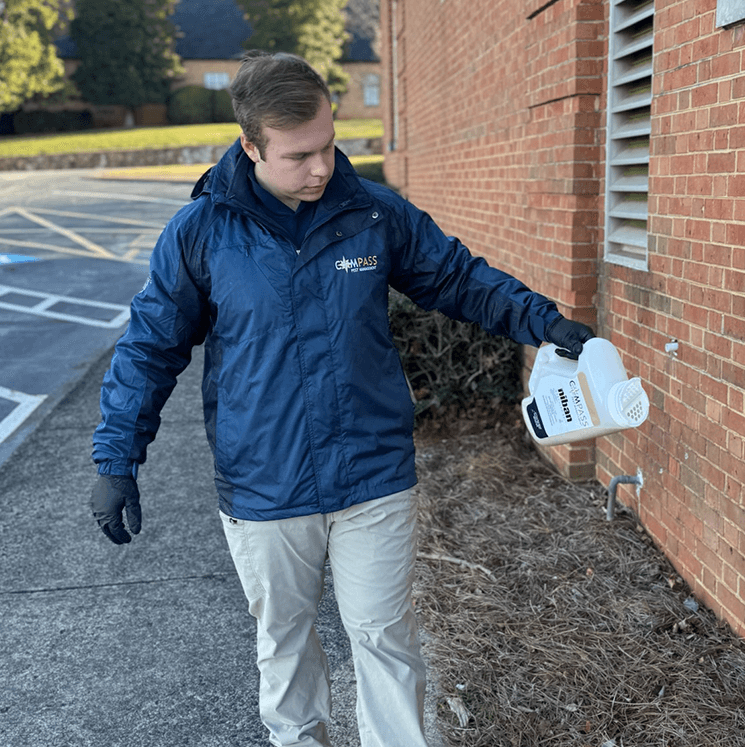
Pest Control for Bees, Wasps, and Hornets in Greenville, SC
Dealing with stinging insects such as bees, wasps, and hornets can be a serious issue for homeowners and business owners alike. While these insects play a vital role in our environment, their presence near your property can pose significant health and safety risks, particularly for those who are allergic to stings. If you have noticed an influx of stinging insects around your property in Greenville, SC, it’s crucial to address the problem promptly. Compass Pest Management is here to provide fast, effective, and humane bee, wasp, and stinging insect removal services to ensure your home or business remains safe and pest-free.
If a colony has made a nest in an area that threatens the safety of you or your family, contact a professional pest control provider. Compass Pest Management offers award-winning pest control services in northern Georgia and Upstate South Carolina. Our friendly office staff and certified field technicians are committed to providing affordable, environmentally friendly solutions to keep you and your family safe. Call for a free quote and inspection today!
Should I Control Stinging Insects Myself?
DIY pest control for bees, wasps, or hornets can be risky business. Stinging insects can be aggressive in defending their territory, and if you threaten that with a spray can of pesticide, you risk being attacked by a swarm. Some people can experience severe reactions to bee/wasp venom, leading to anaphylactic shock in some cases.


Why Choose Compass Pest Management?
-
A Free Inspection & Estimate for Pest or Termites
-
Green Solutions That Protect Your Family and the Environment
-
Safe Products Registered With the EPA
-
Registered, Certified Professionals That Go the Extra Mile for You
-
Affordable Options That Are Tailored to Your Budget & Needs
-
Award-Winning Service From Exceptionally Friendly Staff
Green Pest Control Alternatives
We at Compass Pest Management care about the health and safety of your family as well as protecting the environment. While there may always be a need for traditional treatments, we offer green alternatives to many pest problems.
Our safest solution for pest control is always in the application method. The EPA certifies every applicable material we use, and we ensure that our service professionals are trained to use them effectively and safely. Your Compass technician will help you choose the safest solutions to treat your problem and best protect your family.
Why Compass Pest Management for Bee Control & Removal?
- Award-winning service from exceptionally friendly staff
- Safe products registered with the EPA
- Affordable options that are tailored to your budget and needs
- Green solutions that protect your family and the environment
- Registered, certified professionals that go the extra mile for you
Pest Control for Bees in Greenville, Anderson & Cornelia
Contact our team today to schedule bee removal in Greenville, Anderson, Cornelia and surrounding areas. We offer free inspections and estimates!
FAQ Section
1. What should I do if I see a nest of bees or wasps on my property?
If you see a nest, it's important to avoid disturbing it. Stinging insects can become aggressive if threatened. Contact Compass Pest Management immediately to assess the situation and handle the removal safely.
2. How do I know what type of stinging insect is on my property?
Different species of stinging insects have different behaviors and nest locations. Our experienced technicians can identify the species during our inspection and create a tailored removal plan based on the type of insect involved.
4. Are your methods safe for my family and pets?
Yes, safety is our top priority. We use eco-friendly, non-toxic treatments whenever possible. Our team is trained to handle stinging insects carefully to prevent harm to you, your family, and pets.
5. What if I’m allergic to stinging insects?
If you or someone on your property is allergic to stings, it’s important to seek professional help immediately. Our team will remove the nest quickly and safely to reduce any risk of stings.
6. How long does it take to remove a nest?
The time required for nest removal depends on the size of the infestation and the location of the nest. Typically, removal takes a few hours. We will provide a time estimate during the initial assessment.
7. Can stinging insects return after removal?
After we remove the nest, we take steps to prevent future infestations, such as sealing entry points and applying deterrent treatments. However, it’s important to maintain your property to avoid attracting new colonies.
-
Anderson, South Carolina Office
307 Broad St
Anderson, SC 29621 Map & Directions -
Greenville, South Carolina Office
754 Mauldin Rd
Greenville, SC 29607 Map & Directions -
Cornelia, Georgia Office
221 Fore Acre St
Cornelia, GA 30531 Map & Directions
Rated 5 Stars by Our Satisfied Customers
Discover why our clients rave about our exceptional service, quality, and care! See what makes us their top choice!
-
"Great Customer Service!"
He was thorough and took the time to discuss and explain his ideas on fixing my issues and provided a detailed estimate to do so.
Scott W. -
"Highly Recommend!"
The staff are also lovely people to interact with, from the service technicians to the scheduling and billing department. I highly recommend Compass!
Shannon R. -
"Very Professional!"
He is professional and knows his stuff. He went above and beyond and explained what he did. Before he came in, he even took off his shoes. Before he left, he told me to call if there were any issues.
Brittany C. -
"Extremely Knowledgeable!"
This was our first appointment at a new house with Compass and Dan was fantastic!
Kim C. -
"Great Customer Service!"
Always courteous and thorough. Calls when I’m not there to make sure I don’t need anything above and beyond the normal service .
Clint E. -
"Amazing Job!"
Luke from Compass Pest Management was very professional and courteous. He did an excellent job treating our property to keep out unwanted pests.
Sarah T. -
"Very Professional!"
Once again Robert has done an excellent job. It's really nice having a great service technician that is knowledgeable, professional, and does his job efficiently.
Harold B. -
"Business is Amazing!"
This business is amazing! Not only do they take care of both my businesses, but they do it with professional attitude and efficiency.
Rufino P.
